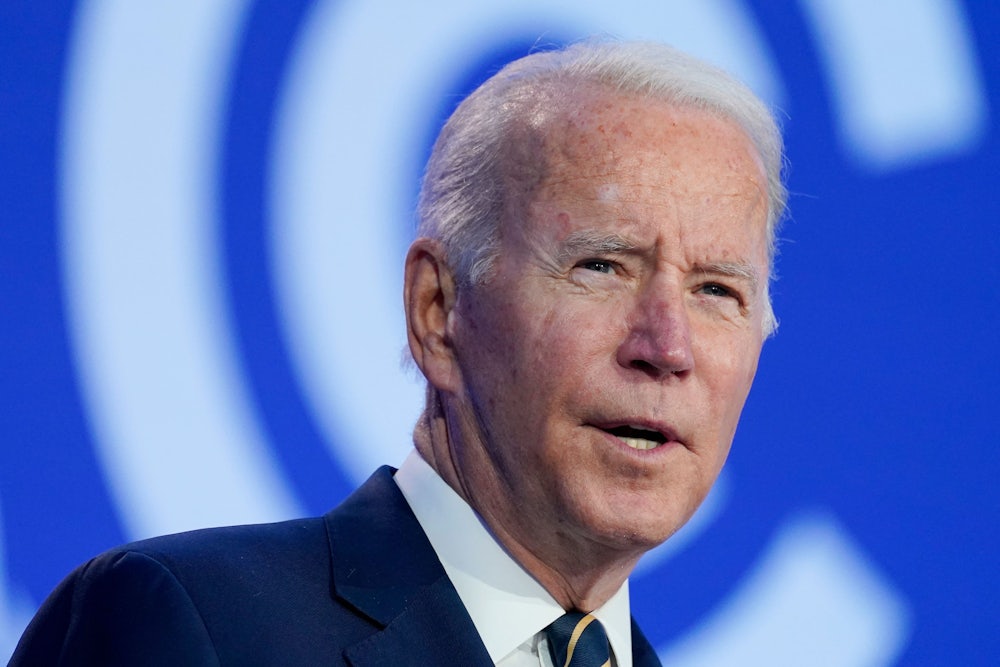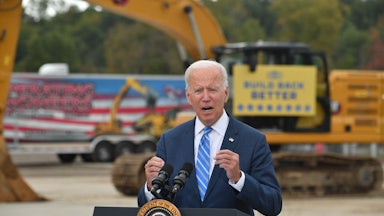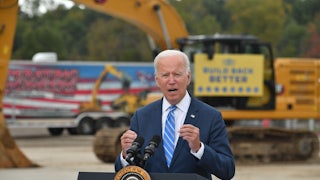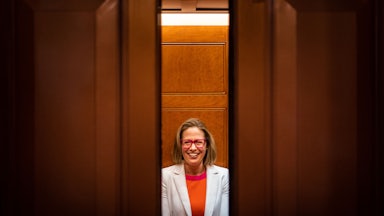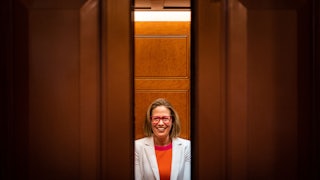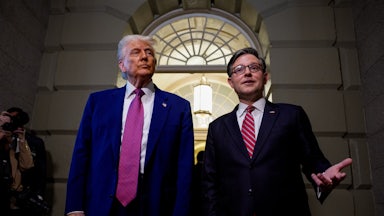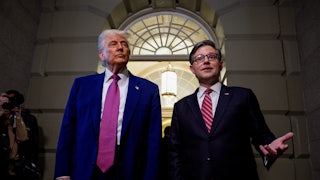Welcome, once again, to the beginning of infrastructure week, the “Hotel California” of congressional politics. House Democrats hoped this week to vote on a pair of bills that, in tandem, amount to the crux of President Biden’s legislative agenda: a bipartisan infrastructure bill that passed the Senate in August and the Build Back Better Act, a $1.75 trillion social spending package that’s largely focused on childcare and climate change.
Last week, Biden attended a House Democratic caucus meeting to present a framework for the Build Back Better Act, also known as “the reconciliation bill,” a shorthand referring to the complicated process by which it will be able to pass the Senate without any Republican votes—assuming, of course, that all Senate Democrats are willing to cast their votes for it, something that has proven to be an elusive goal over the past few months.
In pursuit of unanimity, the framework, and the more than 1,600 pages of legislative text that followed it shortly thereafter, is considerably pared down from the loftier goals and larger top line that it once had. Some of progressive Democrats’ biggest priorities—including paid leave, expansion of Medicare to cover dental and vision care, and prescription drug reform—have been sacrificed along the way. Negotiations continued over the weekend to restore one or all of these provisions to the final bill; Senate Majority Leader Chuck Schumer said on Monday that “we are making regular progress to lower prescription drug prices as we work to refine the agreement.”
(The Build Back Better Act would amount to $1.85 trillion with $100 billion for immigration reform, but thanks to the arcane rules guiding the reconciliation process, that portion is all but certain to be excised from the final bill. Senator Dick Durbin told reporters Monday that senators would present a “plan C” on immigration to the Senate parliamentarian, arbiter of Senate rules and of what can and cannot be included in reconciliation, as soon as Tuesday.)
While Biden pledged that the revamped bill, lowered from its initial $3.5 trillion cost, would be able to garner support from all Senate Democrats, it did not receive full-throated endorsements from Senators Joe Manchin and Kyrsten Sinema, the bill’s two biggest skeptics.
In remarks on Monday, Manchin aired continued doubts about the reconciliation bill, saying that he “will not support a bill that is this consequential without thoroughly understanding the impact it will have on our national debt, our economy, and the American people.”
“I, for one, also won’t support a multitrillion-dollar bill without greater clarity about why Congress chooses to ignore the serious effects inflation and debt have on our economy and existing government programs,” Manchin said, saying that Congress “must allow time for complete transparency and analysis.”
The bill does provide offsets to pay for the spending, but it has not yet been scored by the Congressional Budget Office, which provides cost estimates by legislation. Given the size of the Build Back Better Act, it could take weeks for the CBO to provide a score. “I think a lot of us would feel a lot more comfortable with a CBO score,” Representative Jim Costa, a moderate Democrat, told reporters on Monday. (House Budget Committee Chair John Yarmuth said on Monday that the CBO said it would not be able to provide a score until two weeks after the text is ready.)
Manchin called on the House to vote immediately for the bipartisan infrastructure bill, which he helped shepherd through the Senate in August, accusing progressives of holding the bill hostage in their efforts to get commitments from him—and moderate Democrats in the House—to support the Build Back Better Act. “Holding this bill hostage won’t work to get my support for the reconciliation bill,” Manchin said.
House progressives, understandably, worry that if they vote for the bipartisan bill, moderate Democrats will simply balk at voting for a larger social spending bill. Last Thursday, Speaker Nancy Pelosi expressed hope that the House would vote on the bipartisan bill that day, but progressives held firm in their desire to vote for the two in tandem, thus resulting in House Democrats punting further action on both until this week. Manchin’s words echoed frustration from moderate House Democrats who had hoped for a vote on the bipartisan bill last week.
“I’m open to supporting a final bill that helps move our country forward, but I am equally open to voting against a bill that hurts our country and the American people,” Manchin said.
Manchin’s remarks essentially throw a wrench into House Democrats’ plans to take up both bills this week. Without a firm commitment from all 50 Democratic senators, progressives cannot trust that moderates will support the larger reconciliation bill.
But it’s unclear whether Manchin’s words will push House Democrats off the track. Speaker Nancy Pelosi also told reporters that she did not believe Manchin said anything new, and that “we are on our course to pass a bill.” If progressives do agree to vote for both bills this week, knowing that Manchin had not fully signed on to the Build Back Better Act, it would amount in part to a leap of faith—and President Biden would have to be the one to provide the safety net.
Biden told House Democrats last week that “we have a framework that will get 50 votes in the United States Senate.” Representative Pramila Jayapal, the chair of the Congressional Progressive Caucus, said in an interview with CNN on Monday afternoon that progressives would be ready to vote on both bills once the $1.75 trillion bill was finalized.
“The president says he can get 51 votes for the bill. We are going to trust him,” Jayapal said. “We’re tired of continuing to wait for one or two people.”
Jayapal told reporters later on Monday that she still believed the House would vote on both bills this week, assuming that the language for the Build Back Better Act was finalized and able to receive support from all moderate Democrats in the House as well. She reiterated her belief that Biden would be able to deliver 51 votes in the Senate, too—all 50 Democratic senators, plus Vice President Kamala Harris casting the tie-breaking vote.
“I am going to trust the president, our members are going to trust the president, and we are going to do the job that we need to do, which is pass both bills through the House,” Jayapal said. Jayapal later added, “I’m going to deliver the whole CPC.” Representative Ilhan Omar, another prominent progressive, told reporters that Manchin’s comments sounded “on brand” and “we are disregarding whatever it is he has to say.”
Other members were more quick to condemn Manchin. In a statement, Representative Cori Bush—one of the key progressives needed to support both bills—called on the West Virginia Democrat to support the Build Back Better Act, saying his opposition is “anti-Black, anti-child, anti-woman, and anti-immigrant.”
Some of Manchin’s complaints have also been addressed in the bill. In a statement released after his remarks, White House Press Secretary Jen Psaki said, “We remain confident that the plan will gain Senator Manchin’s support.”
“Senator Manchin says he is prepared to support a Build Back Better plan that combats inflation, is fiscally responsible, and will create jobs. The plan the House is finalizing meets those tests—it is fully paid for, will reduce the deficit, and brings down costs for health care, childcare, eldercare, and housing,” Psaki said.
Manchin’s comments did not go over smoothly with some of his Senate colleagues, either. Democratic Senator Jon Tester said Manchin “made a mistake today by going out and making this news conference.” When asked to elaborate on this comment, Tester said: “I think at this moment in time, trust is a hard thing. I don’t want to give people excuses to vote against the BIF (bipartisan infrastructure framework) or against reconciliation.”
“I’m not sure [of] the purpose of his press conference, but the feelings that he shared were not new,” said Senator Debbie Stabenow.
But Senator Tim Kaine said that he was not concerned about Manchin ultimately supporting the bill.
“I think there were comments that reflected some frustration that he’s feeling, but we’re getting these bills. And I’ve known Joe for 20 years. He’s never surprised me. I doubt he’s going to surprise me on this,” Kaine said. “I’d be shocked if he doesn’t support it.”
Regardless of Manchin’s comments, it appears that House Democrats will press forward with their initial plan to vote on both bills this week. Pelosi told House Democrats in their leadership meeting on Monday that it is possible the Rules Committee may take up the reconciliation bill on late Tuesday or Wednesday.
This might seem like an about-face for progressives, who just last week were unwilling to vote on both bills without firm commitments from moderates. But Jayapal said that progressives had said “for weeks and months” that they wanted both bills to pass the House, as long as they had assurances of Senate support.
“We’re getting the assurance from the president,” Jayapal argued, adding that several progressive priorities were included in the latest framework for the bill. “Had the framework that was outlined not had a majority of our priorities, that would have been different. But we’ve been working with the White House over the last several weeks. We got the majority of our priorities in.”
Jayapal also said that progressives “won the debate” of whether to include many programs for a short period of time—their preference—or a few programs for a longer period of time. (In his remarks, Manchin accused Democrats of “shell games” and “budget gimmicks” to make the cost seem smaller than it will be by only extending programs for a short period of time.)
“It’s the same tone I’ve had, which is positive that we’re going to get both votes in the House and we’re not going to leave anybody behind,” Jayapal said.
